Reflections on the Practice of Holding in the Light
In recent years, many meetings have begun offering a time for those present to name others they would like to “hold in the Light.” This is usually done toward the end of or following worship. When the practice first began, I was a little annoyed by this term: its meaning seemed ambiguous, and it felt like another example of Friends having our own jargon for what others practiced by a different name. I was glad, however, that Friends were being given a chance to name publicly their deepest concerns and needs, and that Friends in theologically diverse meetings, like mine, had found a way to join together in what I consider communal intercessory prayer.
I have since had a shift in my thinking. I now wonder whether the undefined meaning of this practice is actually a gift. It helps avoid serious problems with intercessory prayer as it is often practiced and can free us from expectations and limitations that may inhibit the rich potential shared, focused prayer can bring to Friends.
We Are Not Alone
Over the centuries, countless Jews, Christians, and Muslims have been comforted by the words of the psalmist: “Yea, though I walk through the valley of the shadow of death, I will fear no evil: for Thou art with me. Thy rod and thy staff they comfort me.” We are not alone as we face the many challenges of living, even the great separation we call “death.” Prayer, alone or with others, enables us to experience in our bodies and our hearts the love of God and the love of others. This is transformative. It enables us to overcome depression, despair, and loss of hope. Any practice in our meetings that gives us a sense of accompaniment, whether divine or human, in facing such challenges is a gift beyond measure.
For our first 150 years, Friends had a practice of writing down the words of dying Friends. (Until recently this was how most Friends understood the term “testimony.”) These were collected and published in a series of volumes called Piety Promoted. A number of these statements can be read in the Pendle Hill pamphlet A Song of Death, Our Spiritual Birth: A Quaker Way of Dying by Lucy Screechfield McIver. They convey these Friends’ sense of peace, and even freedom, as they approached death: springing, I think, from their feeling of being held in love.
When we hold someone in the Light, we are asking God to be with them and with us in our caring for them. We are asking God to help our love reach those we are praying for. God can and does respond to prayers of this kind. I don’t know whether offering such prayers changes God, but such prayers change me. This is very different from asking God—or the universe—for a specific outcome.
When We Love Others, We Dwell in God
What do we mean when we ask others “to hold” someone or a situation “in the Light?” If you asked first Friends what this means, they would probably cite the opening chapter of the Gospel of John, which describes the Light as Christ—“the light of all people” (1:4), “the true light, which enlightens everyone” (1:9), that gives us the capacity “to become children of God” (1:12). In John 8:12, Jesus calls himself “the light of the world.” Early Friends saw Christ as present from the beginning of time, working in the world long before and after Christ’s entry into human history through Jesus’s teaching, healing, and faithfulness unto death. Many Friends then and now use the word “Christ” to refer to this ongoing work of Spirit in human hearts and communities of faith.
The First Epistle of John is mainly about love. “No one has ever seen God; but if we love one another, God lives in us and his love is made complete in us” (1 John 4:12). When we pray for each other, we help each other experience and receive God’s love in its fullness. When we invite Friends to name our own or others’ needs to each other and hold those needs in our hearts, we open ourselves, and them, to the transformative power of God’s ever-present love for us all. I believe this is true whether or not the person being held in love believes in a Higher Power or interprets that love as having anything to do with religion.
What Is Prayer?
I think many Friends feel unable to pray because of uncertainty about what prayer is. Many think of prayer as talking to God or asking for specific things. I do talk to God and ask for results at times, but I’m not really sure what happens when I pray in that way. If I believe, as I do, that God knows everything about me, why name my needs to God? I believe this is because somehow God needs me to name my deepest needs in this way.
There are serious problems, however, with asking God for a specific outcome that we desire or feel we need. If we ask God for something specific and our prayer is not answered, does that mean we or those we pray for or even God have somehow failed or done something wrong? Many Jews have written about struggling with continuing to believe in a God who “allowed” the Holocaust to happen. I’ve had friends in other churches tell me that when many people have prayed for someone to heal from a life-threatening illness and the person died anyway, the suggestion often made is that either people didn’t pray hard enough or that the person being prayed for was not living in harmony with God.
When we hold someone in the Light, we are asking God to be with them and with us in our caring for them. We are asking God to help our love reach those we are praying for. God can and does respond to prayers of this kind. I don’t know whether offering such prayers changes God, but such prayers change me. This is very different from asking God—or the universe—for a specific outcome.
I have never been able to believe that God chooses to let children die or be abused for mysterious reasons unknown to us. The UK Quaker astronomer Jocelyn Bell Burnell, in her plenary talk at the 2000 Friends General Conference Gathering, described her evolving belief about God. When she decided she was unable as a scientist to believe in a God who was both omnipotent and all-loving, she chose to believe that God is all-loving but does not have the capacity to control all things that happen. Hearing her, I felt led to the same choice.
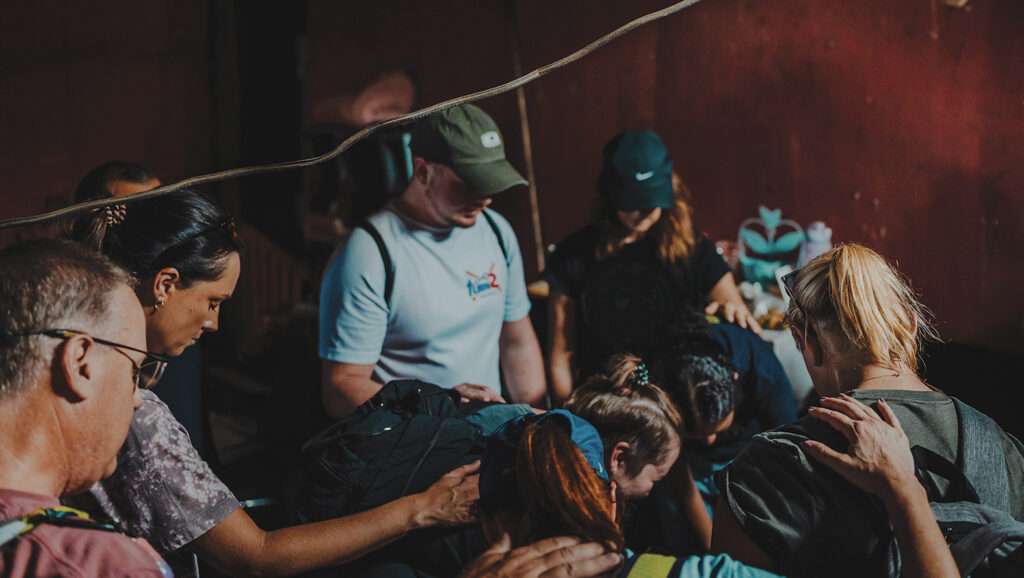
There Are No Limits to the Power of Love
If we cannot count on love resulting in a healing outcome, neither should we preclude that possibility. The gospels are full of stories about healing from blindness, lameness, and physical illness. Others describe casting out devils, which we today may view as healing from severe mental illness. There are many similar accounts of miraculous healings by George Fox and other early Friends.
These accounts often focus on an individual with great spiritual power and healing gifts. In recent years, there has been a renewed interest in healing among Friends but with the emphasis shifting to healing through communal prayer. A more focused kind of communal prayer happens when Friends gather specifically to do this work. Some Friends are holding meetings for healing where one or more are held in additional extended prayer around specific needs or hopes. Communal healing prayer also happens when we settle into worship during a meeting for business if we are in disunity or see a rift rising within the body of our faith community.
Whether the healing we hope for happens or not (at least in the time frame or in the form that we hoped for) is a deep mystery that we cannot fully understand and certainly cannot predict. This is true whether our longing is for the survival of a deeply ill friend or the end of a brutal war. Whatever happens we are held in God’s loving hands.
Prayer Can Be a Way to Give up Control
As our prayers for others entrust them into God’s hands, these prayers can also change how we relate to those we pray for. As a straight, White male from a privileged background, I was raised to have an answer to every question and a solution to every problem, even those not mine to fix. For example, as a child growing up in a Quaker meeting in the 1950s, I was terrified of the danger of nuclear holocaust, wondering if I would even reach adulthood. Even as a child, I felt personally responsible for preventing the destruction of the earth.
One of the hardest and most misguided “projects” I ever took on was trying to save my father from dying of prostate cancer. When he died, I blamed myself for failing this self-assigned task—and blamed him for not making the changes I’d urged him to make to survive. I lost the opportunity to spend the last years of his life simply loving him and being present with him in his spiritual struggles as he approached death.
I know many Quakers who appear to feel a similar, if less severe, pull to overfunctioning and caretaking. Entrusting each other to God’s love is an important way to slow down, breathe, and do what Spirit is really giving us to do, rather than what our anxieties and addictions pressure us to take on.
My addiction to control harms my relationship with those I work with and love. Al-Anon has helped me recognize and begin shedding my addictive pull to control others and fix problems. In 12-step groups, we help each other learn what is our work and what is not. We learn to “Let go and let God.” I am still learning and working on letting go.
Communal Prayer Opens Us to Receive Others’ Love
It takes trust to receive others’ love, including God’s. If we have been hurt badly or let down or abused, especially in childhood, it’s hard to trust others enough to let their love reach us. It can also make it hard to believe in a loving God or open our hearts to receiving God’s love, but it is worth the risk. The more love we receive across our lifespan, the easier it becomes to trust each other and the universe enough to continue letting love in. As we name our needs to each other, we increase our capacity both to give and receive each other’s love. As we experience others in the meeting praying for us and holding us in love, it builds trust within our faith family. I believe that we increase others’ capacity to receive healing love, even when they do not know we are praying for them.
As we name our needs to each other, we increase our capacity both to give and receive each other’s love. As we experience others in the meeting praying for us and holding us in love, it builds trust within our faith family. I believe that we increase others’ capacity to receive healing love, even when they do not know we are praying for them.
Can We Trust Each Other Enough to Know Each Other More Deeply?
It also takes trust and the capacity for vulnerability to allow others to see the wounds and needs we all bear to a lesser or greater degree, and to ask for others’ love and support. As a faith community, we cannot hold each other in love around specific wounds and needs if we do not know each other and the specific places where each needs help. If we are unable to name our needs and wounds to each other and to God, we cut ourselves off from the full transformative power of love.
How can we make our meetings into the kind of faith family where we trust each other enough to do this? Naming our needs to each other as a meeting opens our capacity to be vulnerable and grow closer. As we experience the meeting holding what we know about each other in tenderness and compassion, trust will grow.
In the past, specific needs and wounds were often known only to an assigned committee or individuals in our meetings. Pastoral care is usually done in secret to respect the privacy of those needing support. Confidentiality (which derives from ethical and legal concepts) is not, however, always the best approach in a faith community. We need to be careful of each other’s trust but also need to balance the need for confidentiality against the benefits of openness, transparency, and mutual knowledge among us as we seek to dwell together in love and trust.
All Are Equally Deserving of Love
Shame is a powerful barrier to sharing our broken places with each other. Friends are more likely to feel comfortable sharing—and receiving others’ requests—around physical illness or losses than issues of addictions, mental health, sexuality, or marital breakdown. Can the meeting hold in love all kinds of hurt, even those that make us uncomfortable or that “the world” says are too embarrassing to talk about?
I have been fortunate to be part of two Quaker men’s groups, each of which ran for many years. We have shared things there that we could not share with the meeting. Even in these groups, there were issues I and others have felt unable to share about. One member killed himself soon after a meeting of one of these groups. We wondered if we could have been a safer container for him to trust us to hold him in love around the enormous pain he was carrying at that time, even while we tried not to blame ourselves for another person’s decision.
God makes no distinction between those wounds and needs that deserve love and support and those that do not. The world’s definitions of shame and propriety lie to us when they tell us we are undeserving of others’ love because of the types of wounds we are bearing.
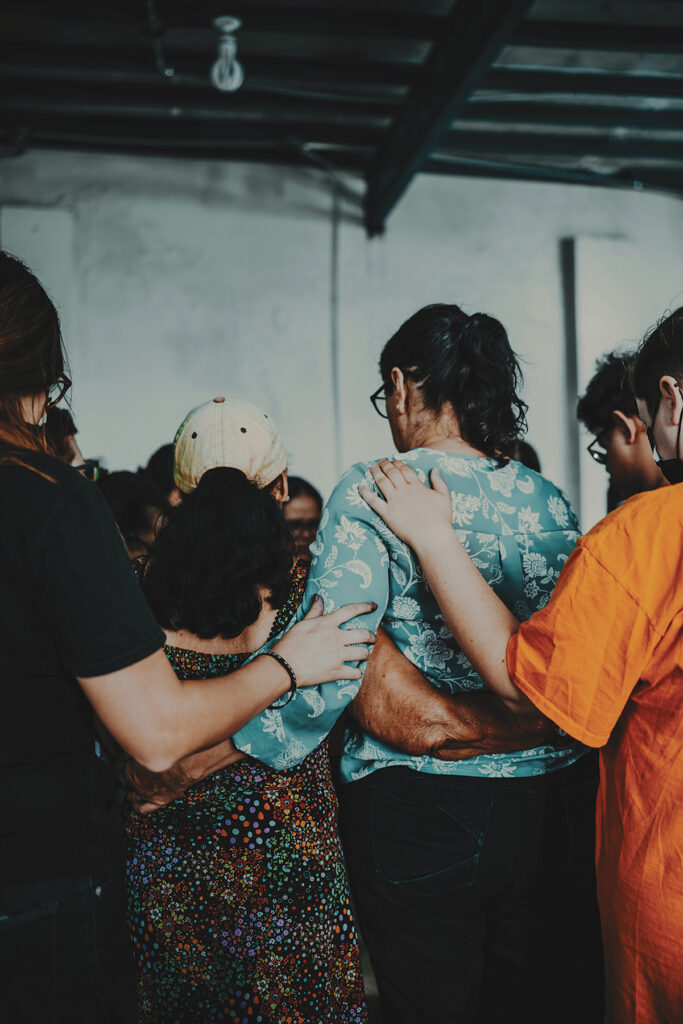
Praying with Each Other for the Healing of the World
In her song “Turning of the World,” Ruth Pelham writes: “Let us sing this song for the healing of the world / That we may heal as one. / With every voice, with every song, we will move this world along, / And our lives will feel the echo of our healing.”
Although most holding-in-the-Light requests in my meeting deal with personal situations, Friends also make requests about situations in the wider world. One faithful Friend in my meeting asks us each week to hold “Our Mother Earth in the Light.” During the Trump presidency, she also asked us each Sunday to hold Donald Trump in the Light. Although Friends in some periods seemed to withdraw from the world’s troubles outside our own faith community, we have always to some degree carried a concern to alleviate suffering wherever it occurs.
On a frigid November day in 1960 on the 300th anniversary of the Declaration to King Charles II (“We utterly deny all outward wars and strife . . .”), I joined a thousand Friends in silent vigil around the mile-long perimeter of the Pentagon. Together we held that war building and the world in prayer for peace. Our prayers did not prevent the Cuban Missile Crisis, the massacres and deaths of the Vietnam War, or the many times the United States has used arms to police the world since then, but we cannot know what good may have come from that long day of prayer for world healing.
My meeting recently held two specially called meetings for worship to pray together for peace in Palestine and Israel. Each week, meeting members join others in an interfaith vigil for peace and justice in the center of town. Such public prayers keep our own hope and resilience strong, and spread that hope to others who see us praying publicly in this way. Prayer for the world also opens our hearts to hear God’s voice calling us to new ways to be faithful in our work of alleviating the great wrongs facing our country and world.
We are all held. Years ago, I encountered a thin volume titled Dreaming Is Now by the late Quaker poet Winifred Rawlins, which was published in 1963, the year of the Cuban Missile Crisis when the world tottered on the brink of nuclear extinction and the year President John F. Kennedy was assassinated. I was especially struck by the closing lines of her poem “Are We Held?”: “And are we / held, and cannot fall / Through holes within the web of love?”
There is much that I do not know, but my life is built around my belief and experience that all of us, the earth itself, and this great universe we are part of are held in a great mystery that is love. May Friends continue to find fresh ways to lift up each other’s needs and those of the world to God and to that web of love.
Further Resources:
- Lucy Screechfield McIver. A Song of Death, Our Spiritual Birth : A Quaker Way of Dying (Pendle Hill Pamphlet #340)
- Marcelle Martin. Holding One Another in the Light (Pendle Hill Pamphlet #382).
- George Fox’s ‘Book of Miracles’, ed. by Henry Cadbury with forewards by Rufus Jones, Jim Pym, and Paul Anderson.
- Johanna Jackson. “Supporting Recovery among Friends” in January 2020 issue of Friends Journal.
- “Closing Minute from QuakerSpring 2011” (on vulnerability and trust within a meeting).
- “Queries on Confidentiality & Openness.”
- The Language of Faces, 1961 documentary film on the 1960 Pentagon Quaker vigil by John Korty.
- Winifred Rawlins’s poem “Are We Held?” is found in Dreaming Is Now by Golden Quill Press, 1963.


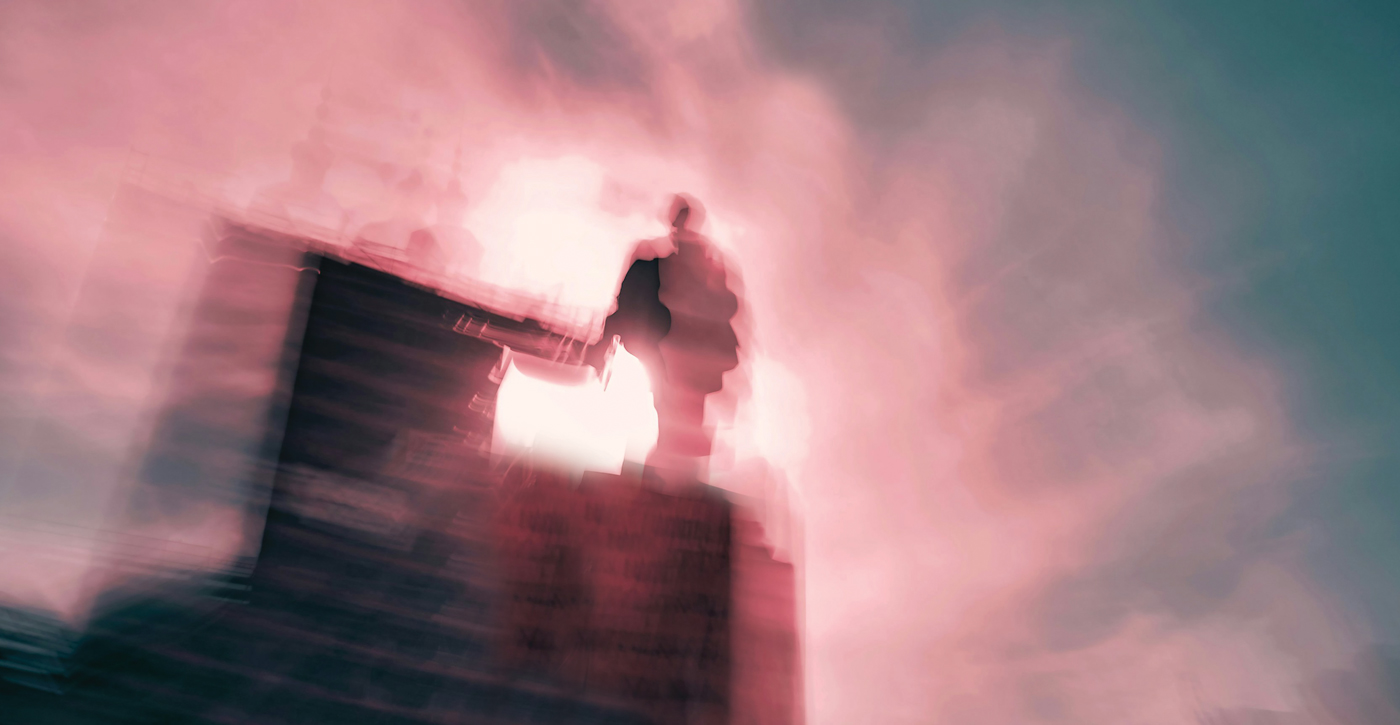
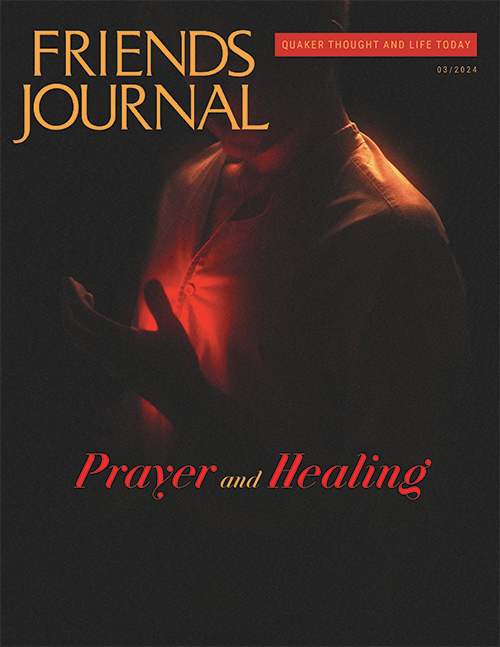
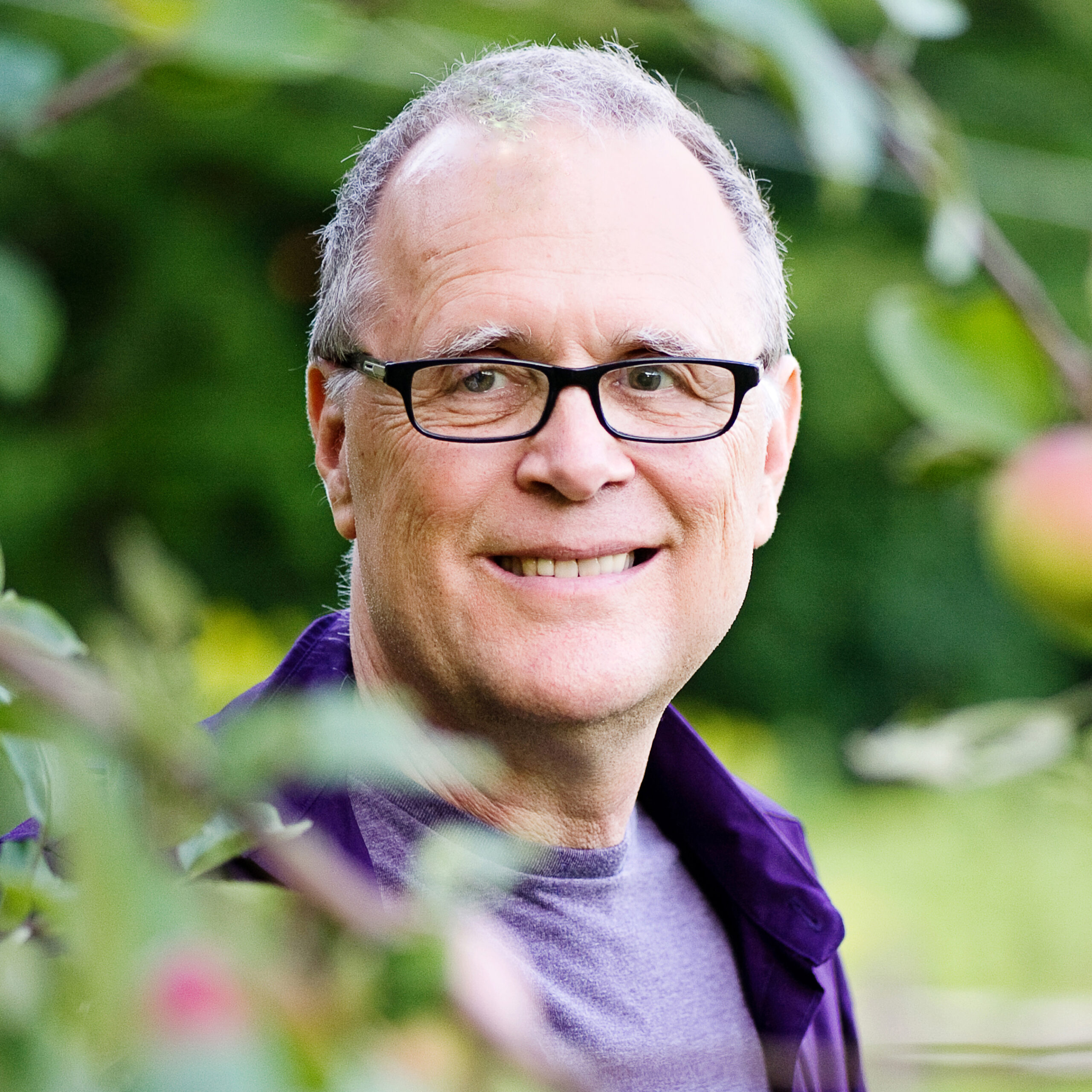


Peter Blood-Patterson’s article on “Holding in the Light” really spoke to me. I have always felt that praying for a particular result was risky. As he stated, if the desired outcome does not come to pass, the pray-er may feel that they didn’t pray “hard enough,” or the prayer’s beneficiary was somehow “out of harmony with God.” In addition, one can lose faith in a loving God who does not heal a person or situation in response to a fervent prayer.
He mentions scientist Jocelyn Bell’s stance that it is incongruent to believe in a God who is both all-loving and omnipotent. (If omnipotent, how can a loving God allow tragedies?) This is also the conclusion reached by Leslie Weatherhead in the 1940s, who wrote The Will of God. I read this book as a college student in the 70s and have re-read it several times since. Like Jocelyn, Leslie and Peter, I have chosen an all-loving rather than all-powerful God. This has been invaluable in dealing with several personal challenges in my own life, which consequently did not shake my faith. I highly recommend The Will of God. And thank you, Peter, for stating this understanding of God so clearly.